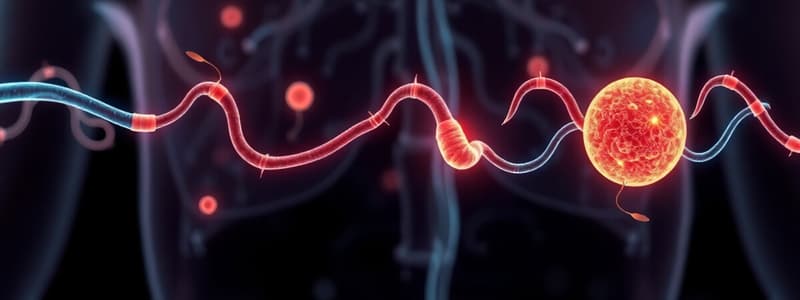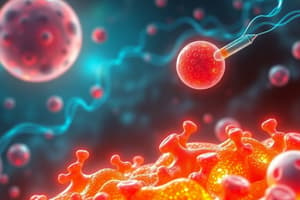Podcast
Questions and Answers
What is the end product of anaerobic glycolysis?
What is the end product of anaerobic glycolysis?
- Glucose
- Acetyl CoA
- Lactate (correct)
- Pyruvate
Which pathway produces NADPH and Ribose 5-Phosphate?
Which pathway produces NADPH and Ribose 5-Phosphate?
- Krebs cycle
- Lipid metabolism
- Hexose monophosphate pathway (correct)
- Glycogen synthesis
Which of the following is NOT a fate of blood glucose?
Which of the following is NOT a fate of blood glucose?
- Direct conversion into fructose (correct)
- Lipogenesis
- Glycogen synthesis
- Energy production via glycolysis
Which substance is produced during aerobic glycolysis?
Which substance is produced during aerobic glycolysis?
What is the primary source of glycogen in the body?
What is the primary source of glycogen in the body?
What is the preferred energy source for the brain?
What is the preferred energy source for the brain?
Which glucose transport mechanism requires energy?
Which glucose transport mechanism requires energy?
What happens to excess glucose obtained from carbohydrates after meals?
What happens to excess glucose obtained from carbohydrates after meals?
During prolonged fasting, glucose can be synthesized from which of the following?
During prolonged fasting, glucose can be synthesized from which of the following?
What type of transport occurs in the epithelial cells of the intestine and renal tubules?
What type of transport occurs in the epithelial cells of the intestine and renal tubules?
Flashcards are hidden until you start studying
Study Notes
Critical Importance of Glucose
- Glucose is the primary carbohydrate in blood and the main fuel source for human cells.
- Brain function relies heavily on glucose as an energy source.
- Cells without mitochondria, like red blood cells, depend on glucose for energy.
- During exercise, glucose is a crucial fuel for muscles, particularly through anaerobic glycolysis.
Glucose Transport into Cells
-
Na+-independent facilitated diffusion transport (GLUT):
- Transports glucose according to the concentration gradient.
- Does not require energy (ATP).
- Utilizes a family of at least 14 glucose transporters (GLUT-1 to 14).
-
Na+-monosaccharide cotransporter system (SGLUT):
- Transports glucose against the concentration gradient.
- Requires energy.
- Coupled to the movement of sodium ions (Na+) into the cell - both move together.
- Occurs primarily in the epithelial cells of the intestines and renal tubules.
Sources of Blood Glucose
- Carbohydrate in Diet:
- Provides glucose after meals.
- Excess glucose is stored as glycogen in the liver and skeletal muscles.
- Glycogen Degradation (Glycogenolysis):
- Liver glycogen breakdown provides glucose during fasting.
- Muscle glycogen breakdown provides glucose for muscles during exercise.
- Gluconeogenesis (Glucose Synthesis):
- Synthesis of glucose from non-carbohydrate sources (like certain amino acids).
- Occurs during prolonged fasting.
Sources of Glucose in Carbohydrate Diet
- Free Monosaccharides:
- Primarily glucose and fructose.
- Fructose is converted to glucose in the liver.
- Disaccharides:
- Sucrose (glucose + fructose).
- Lactose (glucose + galactose).
- Maltose (glucose + glucose).
- Digested into monosaccharides by disaccharidases (sucrase, lactase, and maltase) in the intestines.
- Polysaccharides:
- Starch (plant-based, e.g., rice, potato, flour).
- Glycogen (animal-based).
- Digested by amylase into maltose and then further by maltase into glucose in the gastrointestinal tract.
Fates of Blood Glucose
-
Catabolic pathways:
- For energy (ATP):
- Glycolysis and Krebs cycle.
- Anaerobic glycolysis: produces lactate.
- Aerobic glycolysis: produces pyruvate.
- For synthetic products:
- Hexose monophosphate pathway: Produces NADPH and Ribose 5-phosphate.
- For energy (ATP):
-
Synthetic pathways:
- Glycogen synthesis.
- Lipogenesis.
- Protein synthesis.
- Other carbohydrate synthesis.
Overview of Glucose Metabolism
- Hexose monophosphate pathway: Produces NADPH and Ribose 5-phosphate.
- Glycogen synthesis: Stores glucose as glycogen.
- Glycolysis: Breaks down glucose and produces ATP.
- Anaerobic glycolysis: Produces lactate.
- Aerobic glycolysis: Produces pyruvate.
- Citric acid cycle: Further breaks down pyruvate and generates ATP.
- Electron transport chain: Uses energy carriers (NADH and FADH2) to produce ATP through oxidative phosphorylation.
Studying That Suits You
Use AI to generate personalized quizzes and flashcards to suit your learning preferences.




